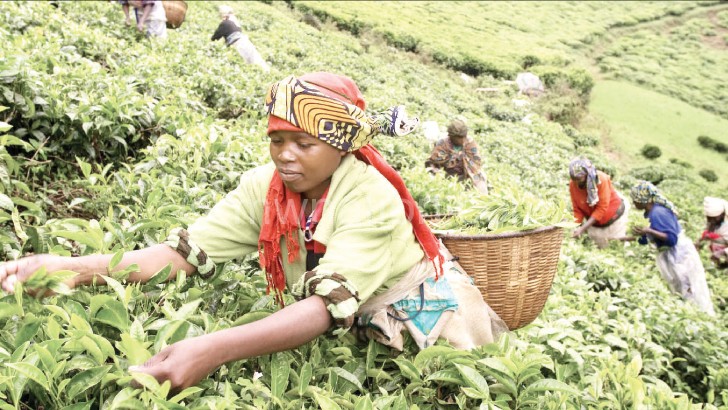Agricultural development in Malawi
The debate that ensued between Farmers Union of Malawi’s Executive Director, Chris Kapondamgaga and Democratic Progressive Party (DPP)’s Economic Advisor, Ken Magalasi about agricultural development through large-scale and smallholder farmers respectively is typical of rhetoric and arena for political economy that benefits neither large-scale nor small-scale farmers.
It is not new. Such ‘gurus’ sugar-coat and decorate inimical ideologies on the basis of rent-seeking.
Transformational development is about socio-economic changes at national down to idiosyncratic household level.
Different theories have been suggested. In Malawi, agriculture is the main driver. It is the principal source of livelihood to approximately 85 percent of the people, contributes 90 percent of export earnings, 85 percent of total employment and 33 to 40 percent of gross domestic product (GDP).

Relatedly, smallholder farmers contribute more than 70 percent of the total food and 20 percent of agricultural exports. Yet, pundits of large-scale agriculture have tried to capture them since colonials, but have failed.
History matters. Colonials created a path which classified the agricultural sector into estate and smallholder sub-sectors. This was premised on exploitative motifs (‘kleptomaniacs’). The purpose was and has been for smallholder farmers to remain ‘small’ so as to provide cheap wage labour to the estates.
These are essentially for the empires in the ‘north’ and ‘west’. They connived, including the present times, with supervisors and chiefs to oppress indigenous people and smallholder farmers. The local elites referred to as compradors or bourgeoisies exhibit such rent-seeking behaviour for petty profits.
Multinational corporations (MNCs) and the empires they support get supra-normal profits. As a result, smallholder farmers, which constitute over 70 percent of rural people in Malawi, have had their resources including land expropriated.
The example of tactics to ensure multinational corporations are protected and have enough land in the contemporary Malawi is that of Land Reforms Programmes. The other is land expropriation from indigenous people in Ntcheu, Traditional Authority (T/A) Phambala and Ngabu in Chikwawa district.
The MNC has bought such vast land in the name of poultry industries. It is not wrong, but the manner in which land from smallholder farmers is expropriated and ‘our’ minerals extracted smacks something treacherous in the armpits of the proponents of ‘large-scale’ farmers.
It is not new. Kamuzu Banda is an example. Kenneth Kaunda of Zambia (incidentally of Malawian origin’s) humanism and Julius Nyerere of Tanzania’s Ujamaa practised collectivisation and villagisation of smallholder farmers as premise of nationalism.
Kamuzu Banda mimicked western lifestyle. Land from smallholder farmers was expropriated in the 1970s for large-scale farmers, mostly cronies and relatives of his party’s supporters. Loans for agricultural inputs and machines were provided. By 1980s, the policy proved a failure. Most estates went into receivership (polite expression in banking) for bankruptcy.
The ‘Democratic era’ never helped matters. Presidents, chief executive officers and all sundries in various organisations followed the policy of ‘where you stand depends on where you sit’ or ‘strike while the iron-bar is still hot’. Rent-seekers increased. Laissez faire and corruption controlled the action arena.
Already marooned and exploited smallholder farmers could not compete with a network of syndicates vaguely referred to as anyamata othamangathamanga (quick and treacherous individuals). The ground was not flat for smallholder farmers.
Joyce Banda, a woman president by ‘accident’ due to Bingu Wa Mutharika’s sudden death, mimicked laissez faire and Cashgate, a shameless syphoning of billions of Malawi kwachas from government coffers.
Smallholder farmers received local and thin cows not for development, but political economy game.
The Democratic Progressive Party (DPP) has had an agenda for agricultural development through smallholder farmers. However, a country can become one of producing and exporting for industrialisation if tools are available.
Tractors are white elephants in Agricultural Development Divisions (ADDS). Malawi Industrial Research and Development Technology Centre (MIRTDC) is dysfunctional. Yet, industrialisation and manufacturing being touted depend on imported machinery MIRTDC and technical colleges could have produced for smallholder farmer to afford.
Smallholder farmers are, therefore, not fools. Large-scale farmers have tried to capture them since erstwhile colonial. Political games of exploitation have to stop.
Collective action for commercialisation of smallholder agriculture to occupy competitive space with large-scale should be the target for all proponents.
Such farmers need information, communication and technologies that are tailored for local knowledge and transfers. This way, it is possible to improve agriculture through smallholder farmers for transformational development in Malawi.
The impossibility may occur where compradors, donors and MNCs connive to destroy developmental State and smallholder farmers. Together we stand.
* Williams Vasulu is the projects coordinator at Climate Justice and Sustainable Livelihood, Eastern and Southern Africa.



